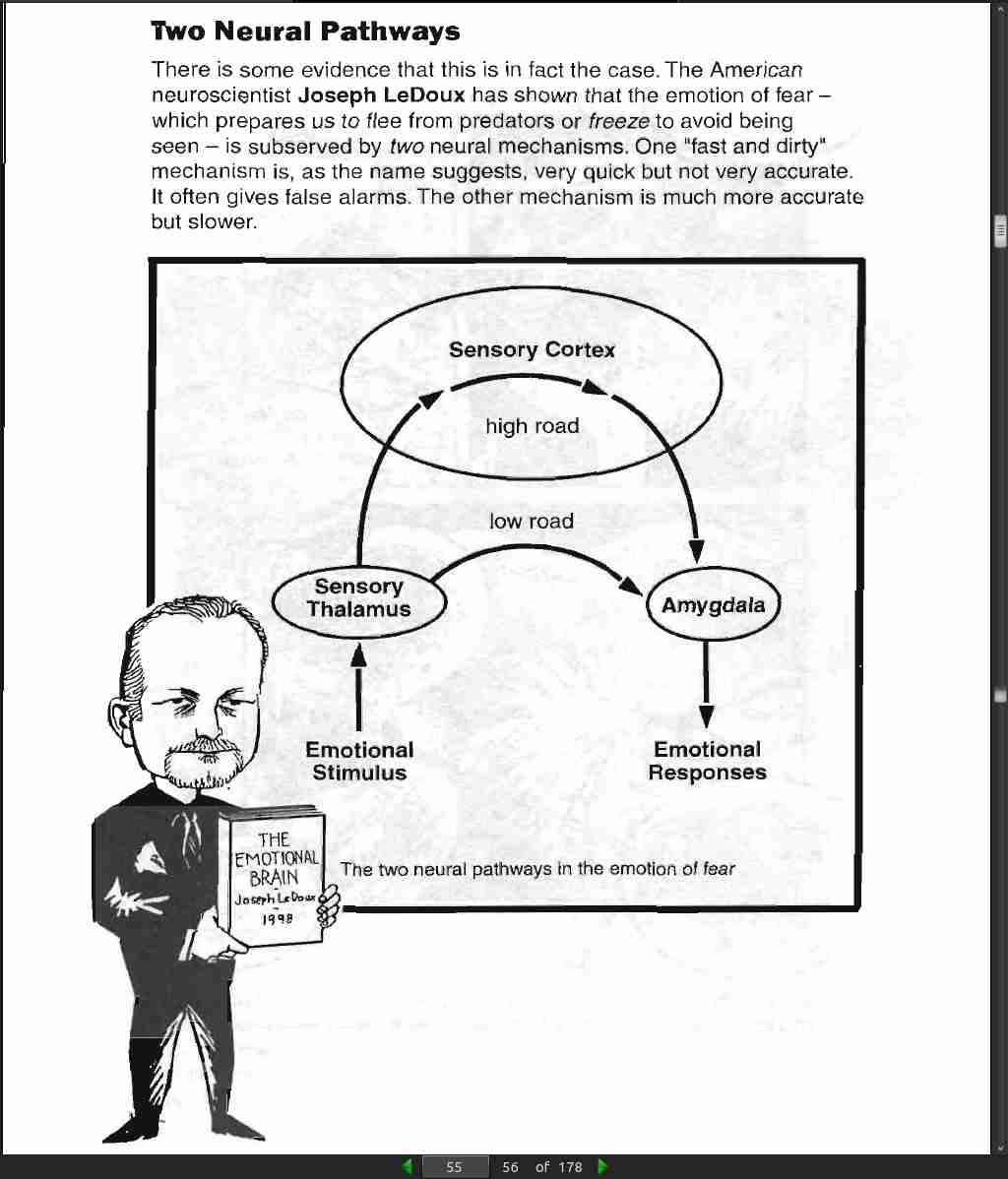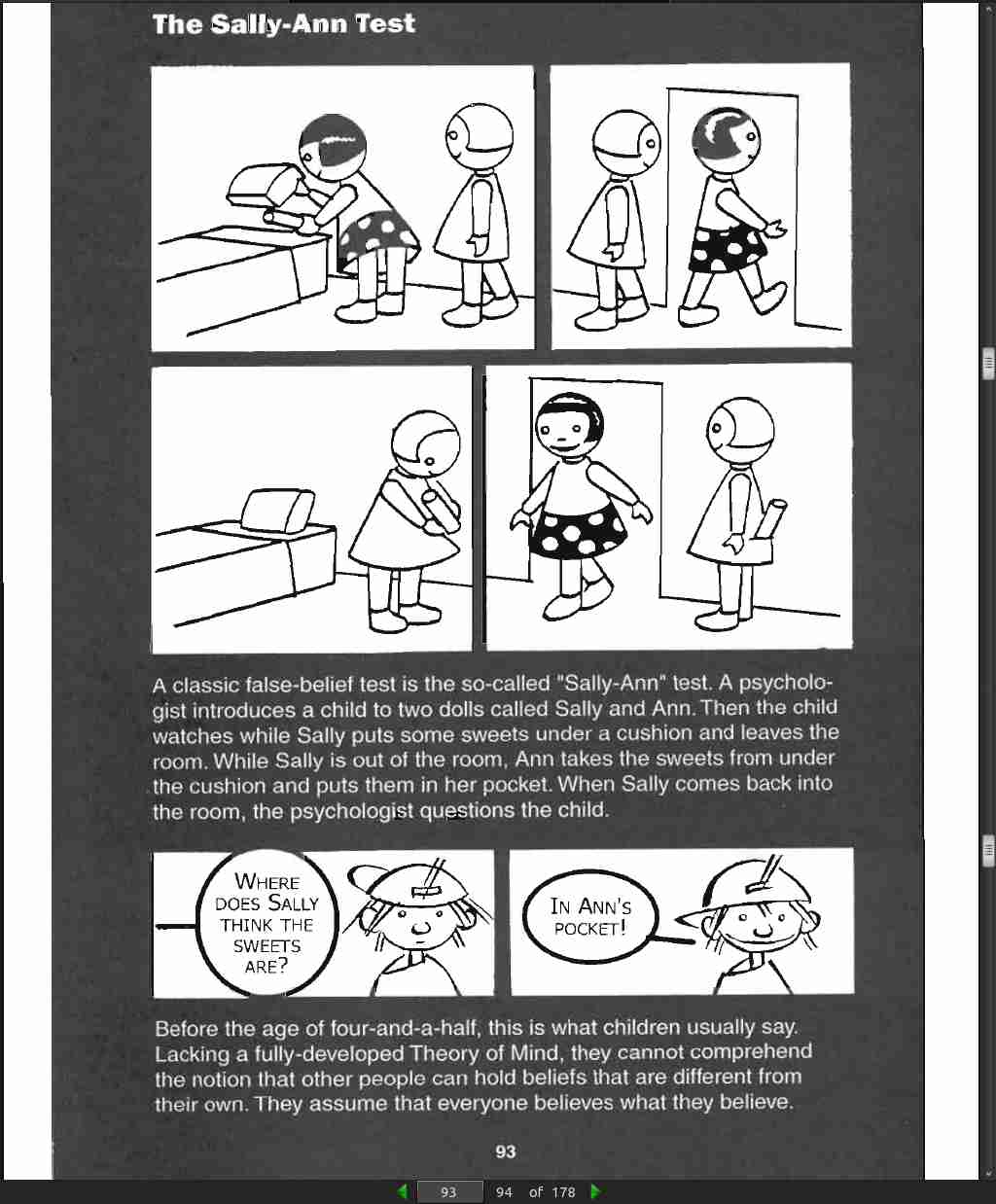Home · Book Reports · 2017 · Introducing Evolutionary Psychology

- Author :: Dylan Evans and Oscar Zarate
- Publication Year :: 2000
- Read Date :: 2017-11-16
- Source :: Introducing_Evolutionary_Psychology-(2000).pdf
designates my notes. / designates important.
Thoughts
While you shouldn’t be put off to the picture-book styling as this really is a decent, albeit limited, introduction, it is annoying that there is no table of contents/chapters which make looking things up a little difficult. This can be forgiven since it is no reference book and will probably only be read once before moving onto more detailed books.
There are many interesting hypothesis that are backed by studies, but the fact that it is all predicated on evolution makes me uneasy. It is one thing to theorize about evolution of biological systems, but it is a whole other thing to speculate on the so-called modules of the mind on top of assumptions made as to the past environmental conditions when said modules may have emerged.
The Darwinian model, much like the Newtonian model, is too mechanistic. They attempt to understand the world in a strictly physical sense, but their usurping of God/religion is to simply replace one system of belief for another. What is the difference between a creation myth and the big bang? Further, this distillation seems to have removed religious constraints that have worked well to keep man “in check”. The modern world stands as a testament to what happens when man elevates himself above a God he no longer believes in.
The book cedes that both nature and nurture play a role in the mind’s development and then immediately posits that changes in the environment can lead to changes in behavior. It uses the cliché that Hitler’s are made, not born. This part of the book reminds me of Cultural Patterns and Technical Change and leads circularly back to the likes of B.F. Skinner and Pavlov which are discarded earlier in the book. It feels like an excuse, not unlike how the Newtonian model was used to justify laissez-faire, to permit social manipulation as rational, scientific, and natural.
Initially seeing that the author hails from the London School of Economics plus the early emphasis on Darwin was concerning. As I progressed, the roster presented reads like a who’s who of manipulators. Machiavelli, Hume, Galton, Darwin, Turing, and Chomsky to name but a few. It is shocking that there is no mention of a Huxley given the emphasis on Darwin (and Galton).
This is one of 3 books that is said to be inspirational to the movie The Matrix. The other 2 are Out of Control and Simulacra and Simulation.
Exceptional Quotes
The brain is hardware, the mind is software.
…possible to change most human behaviour.
to understand how environmental changes will alter the way people behave
- All page numbers based on epub.
page 4:
- The mind is a computer.
page 6:
-
When we explain actions by referring to beliefs and desires, we are claiming that these mental processes are the causes of our actions. This way of explaining actions in terms of beliefs and desires is so common that philosophers call it “commonsense psychology” or “folk psychology”.
-
In the 1920s, some psychologists claimed that folk psychology was unscientific. J.B. Watson (1878-1958) and B.F. Skinner (1904-90) argued that beliefs, desires and other mental processes were not real things.
-
This view is known as Behaviourism.
page 8:
- The second main idea [1st is the mind is a valid concept] of cognitive psychology is that the mind is a computer program. But cognitive psychologists mean something very special by the term “computer” . Basing themselves on the pioneering work of the British mathematician Alan Turing (1912-54), cognitive psychologists define a computer as a set of operations for processing information.
page 9:
-
So, a computer is not a piece of hardware, but a piece of software.
-
The machines are physically different, but when you install the same program on them they behave the same way.
- Cognitive psychologists can describe this program in the language of information-processing without needing to describe the details of the brain. The brain is just the physical machine that runs the program called the mind. The brain is the hardware, the mind is the software.
page 33:
- Noam Chomsky proposes that language is based on “Universal Grammar” and our minds are “preprogrammed” for language.
page 36:
- Jerry Fodor proposes the modularity of the mind.
page 38:
- John Tooby and Leda Cosmides propose massive modularity.
page 46:
- Around 100,000 years ago, some of our ancestors began to emigrate out of Africa, and eventually colonized the whole world. But 100,000 years is only about 5,000 generations- too short a time for evolution to produce any major changes. Humans haven’t changed much in that time, so we can ignore it when discussing the evolution of the mind. This means that all the history of human civilization and culture, from the birth of agriculture some 10,000 years ago until the present, is irrelevant to understanding the design of the human mind.

page 93:
- The Sally-Ann test shows children instinctively develop so-called “mind reading” abilities, understanding what others are thinking given a set of information, at the age of 4.5.

page 160:
- Evolutionary psychologists accept that it is possible to change most human behaviour. Every kind of behaviour results from the way in which our minds interact with our environment, and the mind results from the interaction of the environment with our genes. Different environments will lead the mind to develop differently and change the way in which the mind causes behaviour.
page 161:
- If you want to understand how environmental changes will alter the way people behave, you must understand the way in which the environment interacts with these non-environmental factors.
page 169:
- In the future, the study of human psychology will be completely transformed by the Darwinian approach.
page 170:
-
How the Mind Works, by Steven Pinker (UK: Penguin, 1998; US: Norton, 1997). Over 600 pages, but an easy-to-read introduction by one of the pioneers of evolutionary psychology.
-
The Selfish Gene, by Richard Dawkins (Oxford University Press, 1989). First published in 1976, this book popularized the discoveries of George Williams, William Hamilton, Robert Trivers and other evolution- ary biologists. It remains one of the most important contributions to contemporary Darwinian thinking.
page 173:
- Dylan Evans is a research student in the Department of Philosophy, Logic and Scientific Method at the London School of Economics. He is writing his PhD about cognitive science and the emotions.